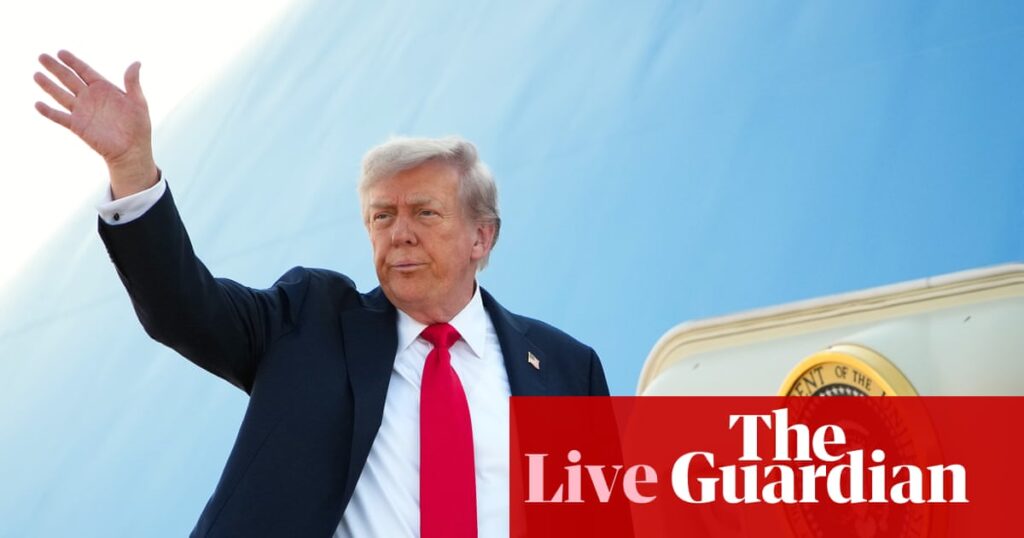Trump confirms plans for ‘economically severe’ sanctions if Russia doesn’t move on Ukraine
Trump also confirms his earlier threat of “severe” consequences for Russia if it fails to show willingness to seriously talk about the end of war in Ukraine.
He says:
“Economically severe. It will be very severe.
I’m not doing this for my health, okay, I don’t need it. I’d like to focus on our country, but I’m doing this to save a lot of lives.
Yeah, very severe.”
He ends the briefing here.
Key events
Meanwhile, the former Obama administration official and former managing editor of Time magazine, Richard Stengel, has objected to reports describing the Alaska summit as “high-stakes”, arguing on social media that it’s “a journalistic cliche” that “plays into Trump’s theatrical framing of the whole artificial made-for-TV ‘event’”.
Putin picks ‘deliberately’ low-profile stops to project confidence, woo Trump en route to Alaska summit
Pjotr Sauer
Russian affairs reporter
Putin touched down in Russia’s far eastern city of Magadan en route to his high-stakes summit with Trump, pausing for what appeared to be a series of trivial meetings with local officials. State media said he discussed the city’s urban planning and inspected a plant for processing and refining fish oil.
Such deliberately low-profile stops are a familiar prelude for the Russian leader before major events – a staged display, observers say, meant to project confidence and control ahead of meeting the US president.
But there was also a pointed gesture clearly aimed at charming Trump, as Putin laid flowers at a memorial commemorating US–Soviet cooperation in the second world war.
Trump has in the past praised Russia’s military record, and Moscow has said the US leader was “deeply impressed” by the Soviet Union’s wartime losses.
Trump confirms ‘wonderful’ call with Belarus’s Lukashenko on prisoner releases, Putin summit
Aaand here it is – Trump confirms his “wonderful” call with Lukashenko, saying “the purpose of the call was to thank him for the release of 16 prisoners,” with 1,300 under discussion.
They also, understandably, discussed the upcoming summit with Putin.
Curiously, Trump’s readout also includes a reference to a meeting in the future.
Here is his social media post in full:
I had a wonderful talk with the highly respected President of Belarus, Aleksandr Lukashenko. The purpose of the call was to thank him for the release of 16 prisoners. We are also discussing the release of 1,300 additional prisoners. Our conversation was a very good one. We discussed many topics, including President Putin’s visit to Alaska. I look forward to meeting President Lukashenko in the future. Thank you for your attention to this matter!
Trump speaks to Belarus’s Lukashenko ahead of Alaska summit with Trump – reports
And the Belarusian news agency Belta has just reported that Trump also spoke with the Belarusian president, Aleksander Lukashenko today.
No more details on the call were reported, and there has been no confirmation on this from the US side (yet?).
Trump to welcome Putin at his plane — Kremlin
Looks like we’re going to get the first big moment of the summit very early on, as the Kremlin has just announced that US president Trump will formally welcome Russia’s Putin at his plane after arriving in Alaska.
Russian press complains about ‘Spartan conditions’ in Alaska

Pjotr Sauer
Despite confident trolling from some members of the Russian delegation (13:49), Russia’s state press, however, were in a less celebratory mood on arrival at their modest sleeping quarters in Anchorage, Alaska’s largest city, where the summit will take place.
With hotel space taken up by the influx of international media, Russian reporters were put up in the local ice hockey team’s stadium, which had been converted into a Covid hospital during the pandemic and fitted with army beds donated by the Red Cross.
“We are living in Spartan conditions,” one reporter is heard complaining in a clip posted on social media.
‘Time to end the war. We are counting on America,’ Zelenskyy says, as he hopes for trilateral summit with Trump, Putin
Ukrainian president Volodymyr Zelenskyy has just posted on social media, saying he expects to get a report from the Ukrainian intelligence services today “on the current intentions of the Russian side and its preparations for the meeting in Alaska.”
Directly responding to Trump’s earlier comments (13:19), he then says:
Indeed, high stakes.
He adds:
“The key thing is that this meeting should open up a real path toward a just peace and a substantive discussion between leaders in a trilateral format – Ukraine, the United States, and the Russian side.
It is time to end the war, and the necessary steps must be taken by Russia.
We are counting on America. We are ready, as always, to work as productively as possible.”
Trump confirms plans for ‘economically severe’ sanctions if Russia doesn’t move on Ukraine
Trump also confirms his earlier threat of “severe” consequences for Russia if it fails to show willingness to seriously talk about the end of war in Ukraine.
He says:
“Economically severe. It will be very severe.
I’m not doing this for my health, okay, I don’t need it. I’d like to focus on our country, but I’m doing this to save a lot of lives.
Yeah, very severe.”
He ends the briefing here.
‘Maybe,’ Trump doesn’t rule out possibility of US offering security guarantees to Ukraine
Trump also gets asked about the possibility of the US providing security guarantees to Ukraine.
He says:
“Maybe, along with Europe and other countries.
Not in the form of Nato, because that’s not going to, you know, there are certain things that aren’t going to happen.
But yeah, along with Europe, there’s possibility …”
Alaska summit’s aim is ‘to get them at table’ with no decisions on Ukraine’s territory without Ukraine, Trump says
Asked if his conversation with Trump will cover territorial issues, Trump says:
“They’ll be discussed, but I’ve got to let Ukraine make that decision, and I think they’ll make a proper decision, but I’m not here to negotiate for Ukraine.
I’m here to get them at a table.
And I think you have two sides. Look, Vladimir Putin wanted to take all of Ukraine. If I wasn’t president, he would, right now, be taking all of Ukraine, but he’s not going to do it.”
Trump talking to reporters ahead of Putin meeting
US president Donald Trump is now chatting with reporters on board of Air Force One.
He says Putin is “a smart guy” and they “get along,” with “a good respect level on both sides,” saying he thought “something is going to come up.”
“I noticed he’s bringing a lot of business people from Russia, and that’s good.
I like that because they want to do business, but they’re not doing business until we get the war stopped.”
On continuing Russian attacks on Ukraine, Trump says he thinks Putin “is trying to set a stage” and “in his mind that helps him make a better deal.”
But the US president says “it actually hurts him, and I will be talking to him about it.”
Trump departs for Alaska
… and he’s off!
Trump’s potentially most consequential trip of his presidency (so far?) is now under way.
Key figures in Russian delegation for Alaska
And when it comes to the Russian delegation, joining Putin are, among others:
-
Foreign minister Sergei Lavrov
-
Foreign policy adviser Yuri Ushakov
-
Defence minister Andrei Belousov
-
Russian Direct Investment Fund chief Kirill Dmitriev
-
Finance minister Anton Siluanov
You can read their profiles in this handy explained by Pjotr Sauer.
As he notes,
The Russian delegation, a mix of old guard loyalists and younger financial power-brokers, hints at Putin’s desire to woo Trump and dangle financial incentives for siding with Moscow on Ukraine.
Trump will also be accompanied by a cadre of his most trusted advisers, among them a property mogul, a former hedge fund billionaire and the country’s top diplomat.
Key figures in US delegation for Alaska talks
Over the last hour we were given the full list of the US delegation for the talks, which apart from Trump includes:
-
State secretary Marco Rubio
-
Treasury secretary Scott Bessent
-
Commerce secretary Howard Lutnick
-
CIA director John Ratcliffe
-
White House chief of staff Susie Wiles
They will also be joined by a group of other senior officials, including deputy chiefs of staff and press secretary Karoline Leavitt, as well as special envoy Steve Witkoff and protocol chief Monica Crowley.
Trump boards plane to meet Putin in Alaska
Oh.
Trump has just boarded the Air Force One, but has nothing to say to reporters gathered both at the White House and the Joint Base Andrews.
A seven-hour flight to Alaska ahead before the US president meets the Russian president for the first time in four years.
USSR sweatshirt and chicken kyiv: Russia dials up trolling before Alaska summit

Pjotr Sauer
Russian affairs reporter
In a not-so-subtle act of trolling, Russia’s foreign minister, Sergei Lavrov, arrived in Alaska on the eve of the US–Russia summit wearing a sweatshirt emblazoned with “USSR”.
Once seen in western capitals as a pragmatic and skilled diplomat, the 75-year-old has in recent years mirrored the Kremlin’s radicalised politics, adopting an increasingly combative tone and resorting to trolling and mockery.
Lavrov’s choice of attire nods to the Kremlin’s long-running narrative: Putin has repeatedly claimed that Russians and Ukrainians are “one people”, denying Ukraine’s legitimacy and territorial integrity while promoting a broader notion of unity with Russia.
Most of Russia’s veteran delegation to Alaska, including Lavrov, began their careers in the Soviet Union and have been accused by the Russian opposition of clinging to a Soviet imperialist mentality.
Under Russia’s occupation of Ukrainian territory, pro-Moscow authorities have dismantled monuments commemorating Ukrainian suffering under Soviet rule, including memorials to victims of Holodomor, the mass famine in Soviet Ukraine in the 1930s that killed millions of Ukrainians.
The former Lithuanian foreign minister Gabrielius Landsbergis quipped on X about Lavrov’s clothing choice: “‘Just give us half of Ukraine and we promise we will stop,’ says negotiator wearing USSR sweatshirt.”
Russian fashion bloggers on Telegram were quick to identify the $120 sweatshirt as the work of Selsovet, a Chelyabinsk-based brand that specialises in “Soviet heritage” clothing.
Lavrov’s antics were the latest in a string of Russian provocations leading up to the summit, aimed at unsettling Ukraine and its European allies. Earlier, the editor-in-chief of RT, Margarita Simonyan, wrote that the Russian press corps flying to Alaska had been served chicken kyiv cutlets.
The menu choice was quickly seized upon by other Russian propagandists.
“Putin and Trump should turn Zelenskyy into a chicken kyiv. There’s no shortage of humour in the Kremlin,” wrote the pro-Kremlin commentator Sergei Markov.
‘HIGH STAKES!!!,’ Trump says ahead of Alaska summit with Putin
In the last few minutes, US president Donald Trump appeared to recognise the importance of the occasion ahead, posting on his Truth Social account:
HIGH STAKES!!!
We may hear from him again in the next, say, half hour as he is about to leave the White House for Joint Base Andrews, from where he will depart for Alaska – and we all know that he loves to chat with reporters!
What’s at stake at the Trump-Putin Ukraine peace summit?

Dan Sabbagh
Defence and security editor
Few believe that Friday’s Trump-Putin summit in Alaska will pave the way for a breakthrough. Russia and Ukraine remain far apart – with the Kremlin seeking to dominate its smaller neighbour while Kyiv wants to move decisively into the western sphere.
Here are some of the key issues that will need to be addressed to reach a meaningful peace settlement.
1. Territory
Russia occupies around a fifth of Ukraine after more than three years of fighting but continues to demand land. Earlier this week the Ukrainian president, Volodymyr Zelenskyy, said Russia wanted the rest of Donetsk oblast, 9,000 square kilometres of territory, in return for a ceasefire. Zelenskyy said Ukraine could not agree, particularly for so little in return. Ukraine’s public would also be unlikely to accept handing over more land to the invader.
2. Security guarantees
Russia says it wants Ukraine to be neutral, though in practice this means a weak neighbour with no ties to the west. In previous negotiations, still referenced by the Kremlin, it has demanded that Kyiv’s military be reduced to a token 50,000. It also still calls for the country to be “denazified”, interpreted as a call for the replacement of Zelenskyy.
Ukraine would like to join Nato, though this has been rejected by the US, leaving it searching for bilateral or multilateral security guarantees from its western allies. Britain and France have promised to lead a predominantly European “reassurance force” that will enter Ukraine in the event of a stable ceasefire, though Russia is opposed to this.
3. Sanctions and trade
Russia wants economic sanctions that have been imposed on Moscow to be lifted. Trump, however, can only speak for the US, with the UK and the EU likely to be more hostile, unless Ukraine has signed up to an overall peace agreement.
4. War crimes, reparations and reconstruction
War crimes and claims for reparations cannot be set aside as part of a peace agreement. The international criminal court (ICC) has an arrest warrant out against Putin over the forced transfer of about 20,000 children from Ukraine to Russia. Zelenskyy has asked that the youngsters are returned in the first stage of any peace discussions, but the ICC demand will not disappear.
5. Other issues
There are many other practical concerns. Ukraine is calling for the release of all prisoners of war alongside an initial ceasefire. Russia holds more than 8,000 Ukrainian PoWs and Ukraine a smaller amount, making one-for-one swaps tricky. But there have been dozens of exchanges since the start of the war, and this may be one of the simpler issues to agree upon.
Read in full:
Morning opening: Welcome to Anchorage, AK

Jakub Krupa
The eyes of the world are on Anchorage, Alaska, where the US president, Donald Trump, will meet with the Russian president, Vladimir Putin, for what the US hopes will be a pivotal moment in their efforts to end the war in Ukraine (the Russian hopes may be somewhat different).
The summit is set to start 11am AKDT, which for us in Europe is 8pm BST, 9pm CEST, starting a flurry of diplomacy between the two delegations in a variety of formats: one-on-one and in larger groups.
It is expected to conclude some seven hours later, according to the schedule, with plans for a joint press conference with both leaders. At least that’s the plan for now.
Local residents are torn between excitement over high-profile visit and trepidation over what US-Russian leaders might agree, with some even joking: “Please don’t sell us back.” (The US bought Alaska from the Russian Empire in 1867).
And that sense of solidarity with Ukraine was palpable on the streets of Anchorage, with demonstrations in support for the war-torn country with various banners further exploring that theme.
But the talks are not going to be easy at all, with both sides coming with almost completely opposite aims and ambitions.
Russia, emboldened by the apparent progress made on the battlefield, will want to try and convince the US that it’s just a matter of time before it meets its military goals, and any earlier settlement would therefore need to meet their maximalist demands.
That’s very much not the view of Ukraine and it’s European partners, demanding respect for Ukraine’s sovereignty, the postwar principle that borders must not be changed by force, and arguing that not giving in to Russian demands is crucial for Europe’s broader security landscape.
When it comes to the host, US president Donald Trump, he implied there was a 75% chance of the Alaska meeting succeeding, and that the threat of economic sanctions may have made Putin more willing to seek an end to the war.
But what happens when the doors close and the two leaders sit down for talks – no one knows.
We will bring you all the latest here with pre-summit analysis and commentary, and later live updates from the summit and first reactions from the US, Ukraine, and Europe.
It could turn out to be one of the days we learn about in history books or… just another day of political theatre, with little practical consequences. Let’s see.
It’s Friday, 15 August 2025, it’s Jakub Krupa here, and this is Europe Live.

